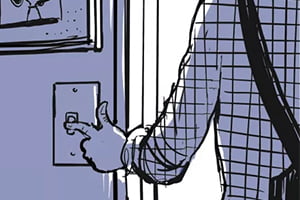
Cartoon in question published in The Augusta Chronicle (Rick McKee)
The Augusta Chronicle (Georgia, USA) has removed from its website the editorial cartoon of Rick McKee editorial cartoon on 3 January related to the candidacy of Elizabeth Warren for the 2020 presidential election.
The scene shows Warren dressed as an American Indian walking up a mountain and thinking "I think I can, I think I can, I think I can, I think I can". A sign reads:"The little injun that could", alluding to the classic children's story "The Little Engine That CouldThe little locomotive that could" by Watty Piper, pseudonym of Arnold Munk. To get the joke you have to read the story.
The trigger, one word
In addition, The Augusta Chronicle published an editorial apologising for the use of"injun" (Indian). It is a term that is no longer used to refer to Native Americans and is considered pejorative.
In the text, entitled"Choice of an offensive word in a cartoon, will not be used again", they assure that they will not use this word again in their newspaper as for many people it is a racial slur and that the intention of the cartoonist and the newspaper was not to offend the indigenous peoples of the United States.
Even so, The Augusta Chronicle states that they do not want the underlying message of the cartoon to be lost amidst the outrage over the use of an offensive word:
"The senator hopes to become president despite misappropriating Native American culture by claiming her heritage, something we, and many others, find offensive. And from that opinion we do not retract."
About "injun
Injun has its origins in the 17th century mispronunciation of 'Indian' and was used as a mockery or to simulate the supposedly heavily accented English of Native Americans or early settlers. Both the word and the related terms "Honest Injun", "Injun time" have been defined as derogatory by indigenous peoples. As a result, they eventually fell into disuse.
It is not the first time that the use of the word"injun" has landed a politician in trouble. In 2010, Michael Steele had to apologise for using the expression "honest injun", an expression used to define someone as very honest but considered derogatory.
In 2011, this word also took its toll on a writer, albeit 126 years after he wrote it. The US publisher NewSouth Books published a version of Mark Twain's The Adventures of Huckleberry Finn, removing the term 'nigger', which appeared 219 times, to replace it with 'slave', and also dropping the term 'injun' to use 'Indian' instead.
The change was proposed by Twain researcher Alan Gribben in the hope of "countering the 'pre-emptive censorship'" after the book was excluded from the school curriculum for its use of terminology associated with racial offence.
Critics, academics and not a few press writers considered this to be a clear case of "politically correct" censorship.
To understand the intention of the cartoon a little better
The use of Warren's Native American appearance in the cartoon is neither innocent nor coincidental. It stems from the Republicans' mockery of the senator after she claimed to have Cherokee and Delaware Indian ancestry.
In 2012, a genealogist with the New England Historical Genealogical Society initially said there was documented evidence that Warren was 1/32 American Indian, based on a family newsletter that indicated her great-great-grandmother was Cherokee
On 10 October 2018, Senator Elizabeth Warren released the results of a DNA test to prove she had American Indian ancestry, she did so in response to continued taunts from President Donald Trump, and other critics. The results of the test were soon to be challenged.
During the 2016 presidential campaign, Trump accused her of lying and tired of calling her"Pocahontas", even "goofy", among other things. And he didn't stop. He even went so far as to promise to donate $1 million to a foundation of her choice if she could prove her claims about her roots.
Related, 120 cases from around the world.








